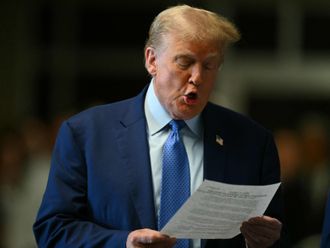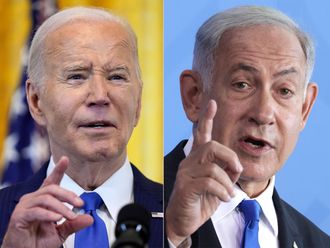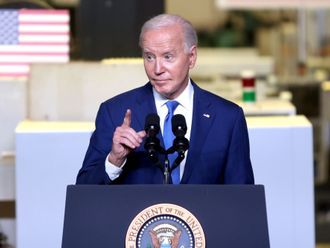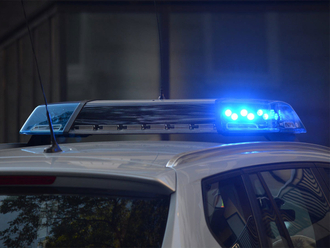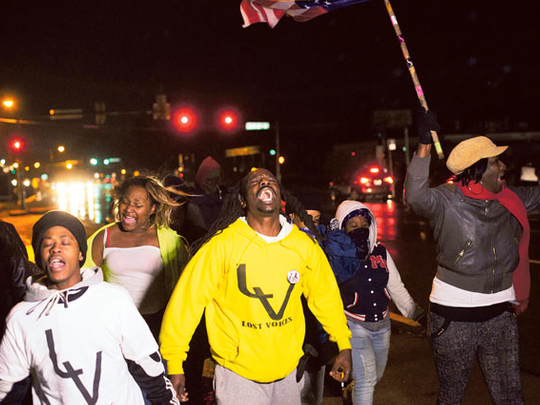
ST. LOUIS: In a city bracing for another convulsion, the waiting game looks like this: University students gather in a gym and rally for peace. Churches draw up plans for “safe spaces,” a refuge during potential chaos. Fringe groups pass out flyers advocating for various kinds of instigation if a grand jury decides not to indict a police officer who 3 1/2 months ago shot an unarmed teenager.
It’s that decision, which authorities have for days signalled was imminent but now seems slow to come, that has brought St. Louis into a bizarre holding pattern, with little agreement here about what will happen in the city after the grand jury resolution.
Eyes were trained on this weekend as the decisive moment for an area that has been rocked by the shooting and the weeks of unrest, some of it violent, that immediately followed. But news came Saturday that the grand jury was still deliberating.
Exactly when it will reconvene is uncertain, though it could be Monday or possibly sooner, according to people knowledgeable about the deliberations. They spoke on condition of anonymity because the grand jury operates in secret. Ed Magee, a spokesman for St. Louis County prosecutor Robert McCulloch, said his office is not confirming when the grand jury is meeting.
That means whatever looming eventuality must continue to loom as the area moves another day closer to the Thanksgiving holiday.
“People are getting anxious, and this doesn’t help that,” said Tony Rice, a frequent protester who helps coordinate the ongoing but small demonstrations outside the Ferguson Police Department. “I bought into the hype of it being this weekend, even though I knew better.”
Meanwhile, President Barack Obama, community leaders, and the father of the slain 18-year-old have all called for peace — a particular concern if the grand jury decides not to indict Darren Wilson, the officer.
Ferguson, the suburb where the killing took place, is prepared for chaos. Business owners have boarded up storefronts, and the FBI — which has about 100 agents and other personnel here, according to law enforcement officials — has warned in a bulletin the grand jury announcement “will likely be exploited” to justify a broader range of attacks on authorities and infrastructure.
Two men tied to the New Black Panthers were indicted on illegal gun purchasing charges. They were presented Friday.
“If Darren Wilson walks, America must be brought to a halt,” said Lou Downey, a supporter of the Revolutionary Communist Party, a group that advocates for a turbulent version of non-violence and civil disobedience in Ferguson. “That means no business as usual. It means blocking streets and walking out of schools. It means we refuse to accept this.”
Saturday night, Lesley McSpadden, Brown’s mother, joined a group of about 60 demonstrators gathered around a memorial of stuffed animals and flowers marking the spot where his body had lain on Canfield Drive. The boisterous, chanting crowd turned subdued as McSpadden addressed them briefly in a light drizzle.
“I love you all,” she said. “It’s a long time coming, but it’s still coming ... justice. I just want you all to be careful. Don’t agitate the police, don’t let the police agitate you. I don’t want any of you to get hurt. When I go into court, I want all of you all with me.”
Whenever the decision does come, the response — whatever form it takes — will be of a different nature than the spontaneous protests that followed the August 9 shooting. In this case, there has been plenty of advanced planning time. That has allowed protest leaders and police to draw up some rules of engagement that could keep a cap on tensions. But some in Ferguson note that even a modest instigation can change a calm gathering into a volatile one, as seen one night in August when one protester’s launch of a water bottle set off a round of tear gas.
Some in Ferguson say they fear the lead-up to the grand jury decision has caused tension to build all the further.
Gunship owners report a spike in sales. Anonymous, a leaderless internet group known to carry out cyberattacks to advance social and political causes, is one of several controversial groups that has arrived in the region. The Ku Klux Klan has distributed flyers around the city saying that protesters have “awakened a sleeping giant” and said that “threats of violence” against police and communities will not be tolerated and will be answered with “lethal force.”
Several black nationalists groups, including the New Black Panthers and the Revolutionary Communists, have had an enduring presence here since August, worrying law enforcement officials at the state and federal level.
Police officials, criticised in the aftermath of the shooting for zigzagging strategies and the use of large tactical vehicles and tear gas, say they are now more prepared to deal with a volatile situation. Roughly 1,000 officers have been given civil disobedience training. The city and county police forces have created a special phone line and liaison for protesters.
“We’ve had since August to improve communication with the community, with protesters, so things can look different this time around,” St. Louis City Police Chief Sam Dotson said.


